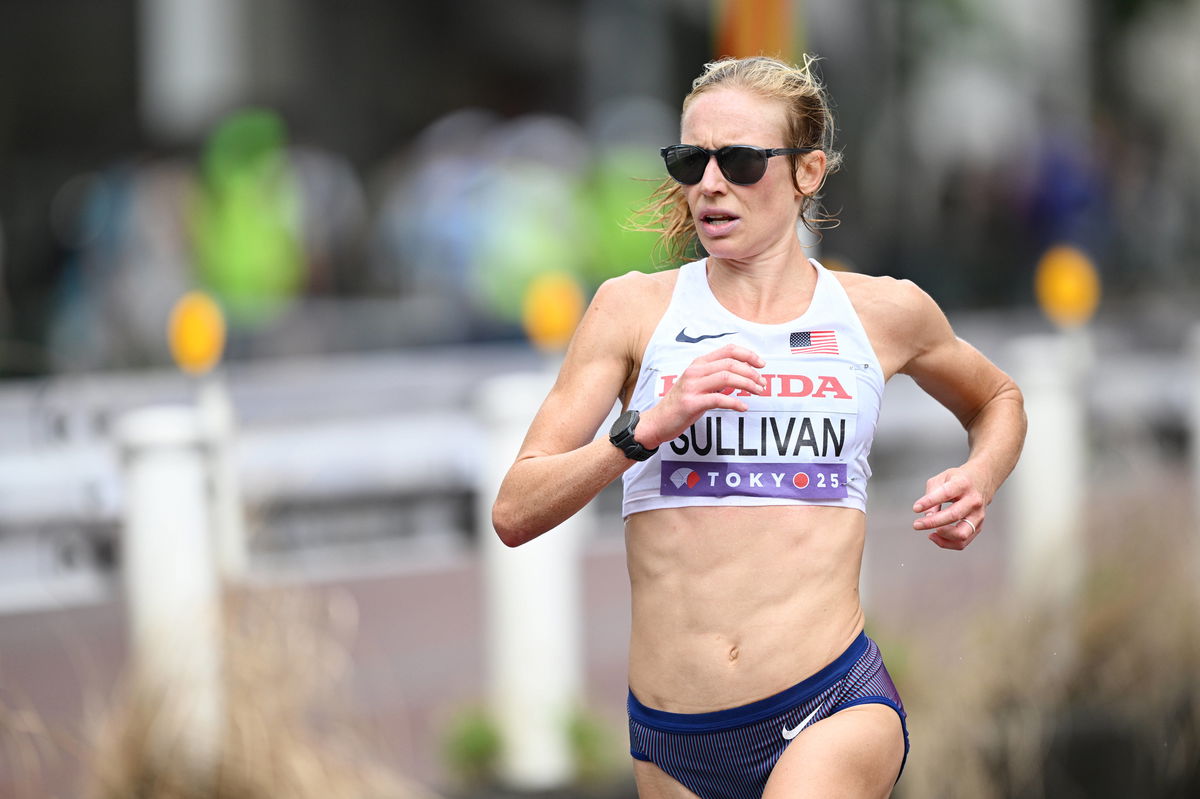
Imago
Susanna SULLIVAN USA, SEPTEMBER 14, 2025 – Athletics : World Athletics Championships Tokyo 2025 Women s Marathon at National Stadium in Tokyo, Japan. PUBLICATIONxNOTxINxJPN aflo_303316118

Imago
Susanna SULLIVAN USA, SEPTEMBER 14, 2025 – Athletics : World Athletics Championships Tokyo 2025 Women s Marathon at National Stadium in Tokyo, Japan. PUBLICATIONxNOTxINxJPN aflo_303316118
In Tokyo on September 13, at the start of the World Athletics Championships women’s marathon, Susanna Sullivan positioned herself among the elite contenders, carrying not only the ambitions of a professional athlete but also the expectations of her sixth-grade classroom, the George Mason distance runners she mentors. Despite the grueling heat and humidity, she led for much of the first 15 miles with sheer determination, while the race itself unfolded into a drama that left medal hopes hanging in uncertainty.
Watch What’s Trending Now!
Sullivan’s performance in Tokyo was a remarkable statement. The 35-year-old, who balances full-time teaching with elite training and volunteer coaching, finished fourth with 2:28:17, narrowly missing a podium position. Leading for over an hour and displaying consistent pacing through the initial 20 kilometers, she maintained a strong presence despite being overtaken by a pack of East African runners in the later stages. “It was such a relief to have the race I trained for,” Sullivan said in a statement to Runner’s World. Her effort marked a sharp contrast to her 58th-place finish at the 2023 World Championships in Budapest, signifying both a strategic and physical breakthrough.
The potential for an unexpected medal arose from reports surrounding Team Kenya’s conduct. A track enthusiast on X, @McKirdyTrained, noted, “I wouldn’t be surprised to see Team Kenya entirely disqualified from the women’s marathon. Their support crew is passing bottles and support over the barriers and at unassigned locations.” Track analyst Chris Chavez added, “Per a USATF spokesperson, Team USA is reviewing the reports about Kenya’s support crew passing bottles and support outside of the unassigned locations along the women’s marathon course. 🇰🇪”
ADVERTISEMENT
There was hope that these reports could alter the medal standings, potentially elevating Sullivan to a podium finish. However, an update from Chris Chavez confirmed that USA Track & Field did file a protest, which was ultimately declined by officials. The official results of the women’s marathon at the World Athletics Championships will stand, dashing any remaining possibility of Sullivan claiming a medal despite her remarkable performance.
Per a USATF spokesperson, Team USA is reviewing the reports about Kenya’s support crew passing bottles and support outside of the unassigned locations along the women’s marathon course. 🇰🇪
Protests have been filed but not one from the U.S. at the moment.
Results right now:
1 –… https://t.co/9TFXp98A8M— Chris Chavez (@ChrisChavez) September 14, 2025
Sullivan’s journey to Tokyo reflects a career defined by patience and guidance. Under George Mason’s head coach, Andrew Gerard, she has improved consistently. “Coach Gerard is great at showing the value of patience. Fifteen years past college, I’m still improving. That’s pretty unique,” Sullivan reflected, illustrating the longevity and discipline behind her competitive edge.
ADVERTISEMENT
Despite the narrow miss in medal contention, Sullivan’s performance provides both inspiration and validation. Alongside teammates Jess McClain, who finished eighth, and Erika Kemp, 52nd, the United States demonstrated competitive depth in challenging conditions. On the other hand, Team Kenya might be facing renewed scrutiny at the 2025 World Championships. But in 2023, a series of doping cases were exposed, revealing systemic issues within its distance-running program. In September 2025, the World Anti-Doping Agency flagged Kenya for non-compliance, highlighting widespread doping among its athletes and the systemic challenges fueling the crisis.
ADVERTISEMENT
WADA warns Kenya as the doping crisis threatens athletes and the national reputation
The World Anti-Doping Agency formally accused Kenya’s Anti-Doping Agency of failing to comply with essential regulations, placing the nation’s athletic credibility under immediate scrutiny. It declared that Kenya had not met several critical requirements highlighted in an audit conducted the previous year, leaving the East African country vulnerable to sanctions beginning on 2 October unless the findings were formally contested within 21 days. Should the warning translate into enforcement, Kenya could lose all WADA privileges, including funding, participation in agency programs, and eligibility to hold positions on international committees. Additionally, the nation would be barred from hosting regional, continental, or world championships for the duration of non-compliance.
Top Stories
Patrick Mahomes’ Dad Faces 10-Year Prison Sentence After Chiefs QB’s Father Reportedly Violated Probation Terms

Prayers Pour In From Jordan Love & Co. as Cowboys Star Mourns Tragic Personal Loss

Justin Jefferson Makes Final Decision on Joining Buffalo Bills After Further Damaging J.J. McCarthy Relationship

Matthew Stafford Makes Final Decision on Retirement After Narrowly Beating Drake Maye For NFL MVP

Multiple PGA Tour Pros Stopped from Playing as WM Phoenix Open Round Is Canceled Over Recurring Problem

PGA Tour Split Into Two as Scottie Scheffler Confirms Stance on Patrick Reed’s Return


Reuters
Paris 2024 Olympics – Athletics – Women’s Marathon – Paris, France – August 11, 2024. Tigst Assefa of Ethiopia, Peres Jepchirchir of Kenya and Amane Beriso Shankule of Ethiopia in action. REUTERS/Aleksandra Szmigiel
The ramifications extend beyond bureaucracy, touching the careers and reputations of individual athletes. In 2025 alone, nineteen Kenyan runners received bans from the Athletics Integrity Unit, while several others, including the women’s marathon world-record holder Ruth Chepngetich, faced provisional suspensions. Sabastian Sawe, one of the fastest marathoners this year, reflected on the broader crisis, asserting that doping “has become like a cancer for Kenyan athletes.” The persistence of these infractions underscores systemic vulnerabilities within the country’s athletic infrastructure, where the pressures of international competition, economic insecurity, and widespread belief in rivals’ transgressions create fertile ground for the use of prohibited substances.
ADVERTISEMENT
Authorities acknowledge that the economic calculus for athletes often renders the risks of doping secondary to the potential rewards, including prize money capable of transforming livelihoods. As Barnabas Korir, a member of Kenya’s athletics federation executive committee, noted, the long-term challenge is cultural: “We have to teach them a different way of seeing things: that using illegitimate means of doing well is not going to help them in the long run; it damages their health, and they might not be successful.” Without substantial reform and sustained oversight, both WADA’s warning and the individual sanctions may represent only the surface of a far-reaching problem entrenched in Kenya’s athletic system.
ADVERTISEMENT
ADVERTISEMENT
ADVERTISEMENT